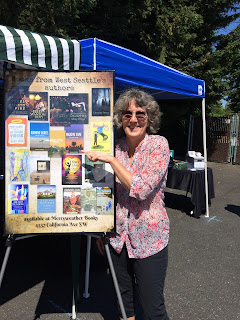The 53rd Avenue cottage sat atop Genesee hill at the back of an unusually large, overgrown yard still dotted with a half dozen ancient apple trees, remnants of the orchards that once covered the West Seattle hills. The day I saw the cottage the sweet fragrance of apples and lilacs laced the salty marine air as it swept over the hilltop. The little white cottage was surrounded by lush green, the sky cobalt overhead. It was love at first sight.
The
cottage began life as an orchard shed back when West Seattle was farmland and
orchards, when nobody, least of all the child who became my father, believed it
would ever become what it is today - a densely populated Seattle neighborhood. But
the farmland gradually disappeared along with the apple orchards once the first
bridge was built between downtown and the peninsula of West Seattle in 1924 and
later when WWII ended.
In
the 1980s my aunt and uncle owned the cottage. When they offered to rent it to
me at a price I couldn't refuse, I was ecstatic. Unlike my Santa Cruz cottage,
this was a single-story, one-room structure although someone had put up walls
to create a walk-in closet at the back of the large room, as well as a bedroom
to hold a twin bed, a tiny bathroom, and a galley kitchen with a washing
machine at the front end. After the noise of the Beacon Hill apartment, the
spacious green yard pulled at my heart. When I moved in, there was only one
door. You entered past the washing machine and through the kitchen to the large
living room. Over time my uncle added a wood-burning stove and a second door—sliding
glass.
I
started flower gardens with plants and advice from Tony, my elderly neighbor. I
explored the neighborhood: my father's childhood home only a block away,
hilltop vistas of Puget Sound and the Olympic Mountains, the deep ravine and
tangled trails of Schmitz Park, the West Seattle Junction. I imagined my father
as a little boy, later a young man, walking the same streets and park paths. I
saw my mother and father, young lovers, sharing ice cream cones from Husky Deli
and throwing stones on Alki Beach. I'd found my roots, but I wasn't home yet.
The
cottage witnessed the demise of my first marriage. Our love could not sustain
his comings and goings - Mexico City to Seattle to Mexico City to Seattle. We
grew apart and went our separate ways. The cottage also witnessed the joys and fears
of new love. When Tom entered my life, we got rid of my twin bed in the tiny
bedroom and moved a large futon sofa into the living room. When I found myself
pregnant, Tom painted fluffy white clouds on the closet walls, a bright yellow
sun on the ceiling, and we had a nursery. When Baby Erin began to walk, he
built a cement block and two-by-four fence around the wood burning stove.
It
all happened so fast. One day I was an expat in Mexico City, the next I was back
in Seattle. I found work, faced unthinkable pain of family tragedy, completed
my Master's degree, found better work, divorced, remarried, gave birth, and was
overcome by fear that the fragile joy, the comfort and peace, I was feeling
would disappear, that I would awaken one morning to an empty cottage, that Erin
and Tom were nothing more than a fantasy.
I
didn't realize it at the time, but looking back I see that I'd begun to find
the home I was seeking. I didn't yet have the self-confidence or trust I
needed, the sense of self essential to feel whole, to accept and give
unconditional love, to be home. But I was getting closer.
The
fantasy was real, and my new family had outgrown the tiny cottage. It was time
to buy a house of our own, a place large enough for a family of three. When we
made the decision, when we found a house only blocks away from our tiny rental,
when our monthly living expenses tripled with a mortgage payment, I was filled
with terror. But we packed our few belongings, said good bye to our beloved
apple trees, and moved down the hill to a house of our own, uncertain what the
future would bring.
That
was 1991. Since then the old orchard lot has been divided and the ancient trees
torn out. Another house, a very large house, has been built on the front
two-thirds of the property leaving the cottage seemingly unchanged at the back
alley but for a paint job. Is it still a rental? Do my husband's murals still
decorate the walls? Was the lilac bush that bloomed late the year of Erin's
birth also sacrificed in the name of development? I do
not know.


















